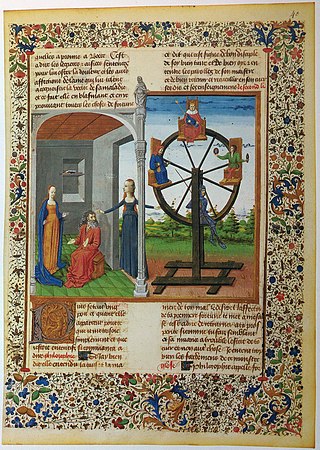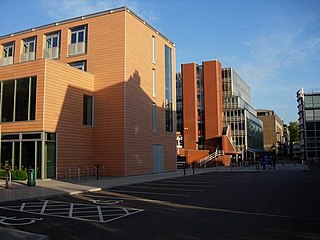Related Research Articles

On the Consolation of Philosophy, often titled as The Consolation of Philosophy or simply the Consolation, is a philosophical work by the Roman philosopher Boethius. Written in 523 while he was imprisoned and awaiting execution by the Ostrogothic King Theodoric, it is often described as the last great Western work of the Classical Period. Boethius' Consolation heavily influenced the philosophy of late antiquity, as well as Medieval and early Renaissance Christianity.
Clive Staples Lewis was a British writer, literary scholar, and Anglican lay theologian. He held academic positions in English literature at both Magdalen College, Oxford (1925–1954), and Magdalene College, Cambridge (1954–1963). He is best known as the author of The Chronicles of Narnia, but he is also noted for his other works of fiction, such as The Screwtape Letters and The Space Trilogy, and for his non-fiction Christian apologetics, including Mere Christianity, Miracles, and The Problem of Pain.

Geoffrey of Monmouth was a Catholic cleric from Monmouth, Wales, and one of the major figures in the development of British historiography and the popularity of tales of King Arthur. He is best known for his chronicle The History of the Kings of Britain which was widely popular in its day, being translated into other languages from its original Latin. It was given historical credence well into the 16th century, but is now considered historically unreliable.
Layamon or Laghamon – spelled Laȝamon or Laȝamonn in his time, occasionally written Lawman – was an English poet of the late 12th/early 13th century and author of the Brut, a notable work that was the first to present the legends of Arthur and the Knights of the Round Table in English poetry.

Rosamond Deborah McKitterick is an English medieval historian. She is an expert on the Frankish kingdoms in the eighth and ninth centuries AD, who uses palaeographical and manuscript studies to illuminate aspects of the political, cultural, intellectual, religious, and social history of the Early Middle Ages. From 1999 until 2016 she was Professor of Medieval History and director of research at the University of Cambridge. She is a Fellow of Sidney Sussex College and Professor Emerita of Medieval History in the University of Cambridge.
George Arthur Holmes, FBA was Chichele Professor of Medieval History at the University of Oxford, and a Fellow of All Souls College, Oxford, 1989-94.

As a literary genre, the chivalric romance is a type of prose and verse narrative that was popular in the noble courts of high medieval and early modern Europe. They were fantastic stories about marvel-filled adventures, often of a chivalric knight-errant portrayed as having heroic qualities, who goes on a quest. It developed further from the epics as time went on; in particular, "the emphasis on love and courtly manners distinguishes it from the chanson de geste and other kinds of epic, in which masculine military heroism predominates."
Eustace Mandeville Wetenhall Tillyard was an English classical and literary scholar who was Master of Jesus College, Cambridge from 1945 to 1959.
Ernest Fraser Jacob was a British medievalist and scholar who was President of the Chetham Society, Lancashire Parish Register Society and Ecclesiastical History Society.
David Joseph Herlihy was an American historian who served as the president of the American Historical Association. He wrote on medieval and renaissance life, and was married to fellow historian Patricia Herlihy. His study of the Florentine and Pistoiese Catasto of 1427 is one of the first statistical surveys to use computers to analyze large amounts of data. The resulting book examines statistical patterns in tax-collecting surveys to find indications of social trends.
Jack Arthur Walter Bennett was a New Zealand–born literary scholar.

Samite was a luxurious and heavy silk fabric worn in the Middle Ages, of a twill-type weave, often including gold or silver thread. The word was derived from Old French samit, from medieval Latin samitum, examitum deriving from the Byzantine Greek ἑξάμιτον hexamiton "six threads", usually interpreted as indicating the use of six yarns in the warp. Samite is still used in ecclesiastical robes, vestments, ornamental fabrics, and interior decoration.

They Asked for a Paper: Papers and Addresses is a collection of essays by C. S. Lewis. This collection of twelve essays by C. S. Lewis was published by Geoffrey Bles in 1962.
This is a list of writings by C. S. Lewis.
James Simpson is an Australian-British-American medievalist currently serving as the Donald P. and Katherine B. Loker Professor of English at Harvard University.
The Floure and the Leafe is an anonymous Middle English allegorical poem in 595 lines of rhyme royal, written around 1470. During the 17th, 18th, and most of the 19th century it was mistakenly believed to be the work of Geoffrey Chaucer, and was generally considered to be one of his finest poems. The name of the author is not known but the poem presents itself as the work of a woman, and some critics are inclined to take this at face value. The poet was certainly well-read, there being a number of echoes of earlier writers in the poem, including Geoffrey Chaucer, John Lydgate, John Gower, Andreas Capellanus, Guillaume de Lorris, Guillaume de Machaut, Jean Froissart, Eustache Deschamps, Christine de Pizan, and the authors of the "Lai du Trot" and the Kingis Quair.

The Department of Anglo-Saxon, Norse and Celtic is one of the constituent departments of the University of Cambridge, and focuses on the history, material culture, languages and literatures of the various peoples who inhabited Britain, Ireland and the extended Scandinavian world in the early Middle Ages. It is based on the second floor of the Faculty of English at 9 West Road. In Cambridge University jargon, its students are called ASNaCs.
Nicolette "Nicky" Zeeman is a British literary scholar. She has been Professor of Medieval and Renaissance English at the University of Cambridge since January 2016 and a Fellow of King's College, Cambridge since 1995.
John Edgar Stevens, was an English musicologist, literary scholar and historian, whose research focused on the words of medieval and Renaissance music. He was the Professor of Medieval and Renaissance English at the University of Cambridge from 1978 to 1988.

The Faculty of English is a constituent part of the University of Cambridge. It was founded in 1914 as a Tripos within the Faculty of Medieval and Modern Languages. It could be studied only as a 'Part I' of a degree course, alongside a 'Part II' either in medieval languages or from another Tripos. In 1926, the course became a distinct Faculty.
References
- ↑ "Nicky Zeeman appointed as Professor of Medieval and Renaissance English". Medieval Research Group. Faculty of English, University of Cambridge. 9 November 2015. Retrieved 5 April 2018.
